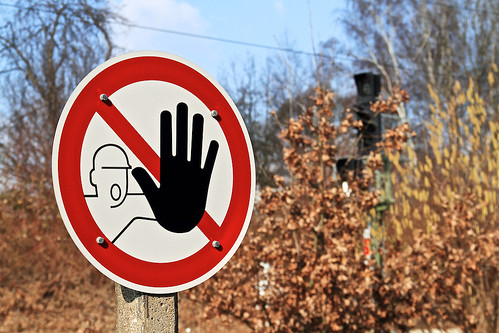Sometimes I get asked how to say single English words or phrases in German, and more often than not I find myself having to explain my translation because it’s not what the person asking expected to hear. They usually say, “Oh, but doesn’t that word mean…?” to which I usually reply “Yes, it does mean that, but…”. German likes to challenge our minds. Take the word Don’t, for instance.

Photo: frank_behrens on flickr.com under a CC license (CC BY-SA 2.0)
Example conversation:
“How do you say ‘Don’t!’ in German? Like when your friend is about to swing their bag over their shoulder, but you can see if they do it’ll knock over a vase behind them, and so you want to stop them before they smash it to pieces??”
“I would say ‘Nicht!’”
“But doesn’t ‘Nicht’ mean ‘Not’ in German? As in, ‘Ich mache das nicht’ – ‘I’m not doing that’ ?”
“Yes, it does, but…”
Then I often tail off saying something along the lines of “But in this context it means ‘Don’t’”.
So I decided to think about it a bit more.

Nicht. Photo by frnetz on flickr.com under a CC license (CC BY 2.0)
When we give the command “Don’t!” in English, we are saying a shortened version of the phrase “Don’t do that!” or “Don’t say that!”, for example. So, we are omitting the second two words of that phrase because the first one, Don’t, conveys the necessary message.
In German, to say “Don’t do that!” or “Don’t say that!” you’d say “Mach das nicht!” or “Sag das nicht!” Literally, these phrases mean “Make that not!” and “Say that not!”. In English, these phrases aren’t correct, so they couldn’t be translated literally.
By saying “Nicht!” as the shortened version of “Mach das nicht!” (‘Don’t do that!’), we are omitting the first two words of the phrase this time. Why? Because the word ‘Nicht’ is the word that conveys the necessary message here.
Therefore, if you think of the word ‘Nicht!’ as a shortened version of the phrase ‘Mach das nicht!’, this translation makes sense.
****
I am no expert at explaining grammar (which is why I tend to stay away from posts of this nature), but this is how I would explain it to a German learner if I was asked. I guess I hope this simplistic approach might help those of you who find German grammar hard to digest.
Can you think of any alternative ways of saying ‘Don’t!’ in German?
Leave them in the comments!







Comments:
Joseph T. Madawela:
This is an excellent post can kein or keine also b used like this?
Robert Shaw:
@Joseph T. Madawela One could also say “Tut Das Nicht”
Constanze:
@Joseph T. Madawela Kein(e) means ‘no’ in the sense of having ‘none’ of something. For instance: Ich habe keine Schuhe = I have no shoes.
Joe McNemar:
In this context, wouldn’t “Halt!” convey the same concept of “Stop, don’t do that.”
Constanze:
@Joe McNemar Yes 🙂
Carmel Grima:
When my 7 year old grandson is about to do something wrong I often hear my daughter shout ,
Neiiiiiiiiiiiiiiiiiiiin Rudi !
Lorraine:
Thanks for the post! I have another relevant question about “No”. What’s the difference of “kein” and “nicht”?
Constanze:
@Lorraine Glad you liked it, Lorraine.
Nicht means “not” (or “don’t” – as explained in the post).
Kein(e) means ‘no’ in the sense of having ‘none’ of something. For instance: Ich habe keine Schuhe = I have no shoes.
Hope that helps!
Annik:
‘machen’ = to do, not to make (does it not?)?
Constanze:
@Annik It means both 🙂 To make/to do
jon:
Can’t nicht also mean no? I know that when I am at a trade fair and the vendor and I are going over the list of merchandise, the response is “Nicht” if I do not want it rather than “Nein”. I suppose once again it is short for “Ich will es nicht.”
Constanze:
@jon It can mean ‘no’, you’re quite right. If someone were to grab you, for instance, you could scream ‘Nicht!’ at them as a way of saying no (‘Don’t do that’ – ‘Mach das nicht’).